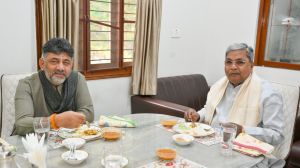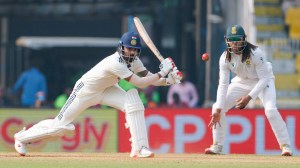Sadr offers truce as US troops close in
US forces tightened their grip around Najaf on Wednesday and the rebel Shi’ite cleric they have vowed to kill or capture offered peace ...

US forces tightened their grip around Najaf on Wednesday and the rebel Shi’ite cleric they have vowed to kill or capture offered peace terms to spare Najaf a bloodbath. An envoy appointed by Moqtada Al-Sadr said the cleric had asked him to convey peace proposals to the Americans.
Al-Sadr has dropped his conditions for entering into negotiations with US authorities who have vowed to kill or capture him, his spokesman said.
Russia said it would airlift out more than 800 of its nationals and citizens of ex-Soviet states to escape the worsening violence sweeping Iraq.
The 2,500-strong 3rd Brigade Task Force, along with Spanish and Polish troops, set up what US officers called an “exclusion zone” around Najaf.
‘‘Moqtada made positive proposals to end the crisis. I cannot disclose the details. He realises that an armed confrontation is not in anybody’s interest,’’ Sadr’s envoy, Abdelkarim Al-Anzi said.
Iran said the US, its arch-foe, had sought its help in calming the Iraq violence. ‘‘Naturally, there are demands by Americans…that we help resolve the crisis…And we are acting,’’ Foreign Minister Kamal Kharrazi said.
As tension mounted in Najaf, Iraqi mediators said they had extended a shaky truce in Falluja for 48 hours on Wednesday. But violence flared in Baghdad, where US soldiers fired on looters raiding a military truck. A witness said he saw several Iraqis lying motionless and bleeding after the shooting.
Four people were killed and six wounded in Mosul when a Katyusha rocket, aimed at a police station, hit a civilian area. Tension was also high in Karbala where residents said streets were empty amid fears of clashes between Sadr’s militia and US-led forces.
Meanwhile, US President George W. Bush vowed to stay the course and said a June 30 handover to Iraqi sovereignty would go ahead. At a rare White House news conference, Bush called on Sadr to disband his militia. The revolt in Iraq came as insurgents from the Sunni Muslim community, to which Saddam Hussein belongs, responded to a military crackdown in central Iraq by taking on US marines in street battles.
The violence has spurred insurgents to kidnap more than 40 foreigners in Iraq, though many have been released.
A French photographer was the latest to join four Italian private security guards, three Japanese civilians, three Czech journalists, two Arab aid workers and a US contractor on the list of reported hostages.
Russia’s Emergencies Ministry said seven flights from Kuwait and Baghdad would take 553 Russians and 263 nationals of former Soviet states out of Iraq later this week, despite the safe release of three Russian and five Ukrainian hostages on Tuesday. US marines fought Sunni insurgents in Falluja overnight and witnesses said four civilians and two fighters were killed, but negotiators extended a truce for 48 hours.
The US military took no direct part in Tuesday’s truce talks. Ahmed Hardan, of the Iraqi Islamic Party, represented on Iraq’s US-appointed Governing Council, said Iraqi police were to return to duty in Falluja within 48 hours and US forces would withdraw. Hospitals would be resupplied and displaced civilians would return.
Abdul Salam al-Kubaysi negotiating on behalf of Falluja, said only local police would be allowed in the city, not the ‘‘traitors and collaborators’’ of the US-trained Iraqi Civil Defence Corps. He said police could be backed by creating a security force drawn from local tribes — apparently a reference to the gunmen who have been battling the Marines.
No US comment was available and it was not clear if the military had dropped a demand for the surrender of those behind the gruesome murders of four Americans in Falluja on March 31.
Pledging to keep US troops in Iraq as long as necessary, Bush said the latest violence was a ‘‘power grab’’ by ruthless extremists, not a civil war or popular uprising. — (Reuters)



- 01
- 02
- 03
- 04
- 05




























